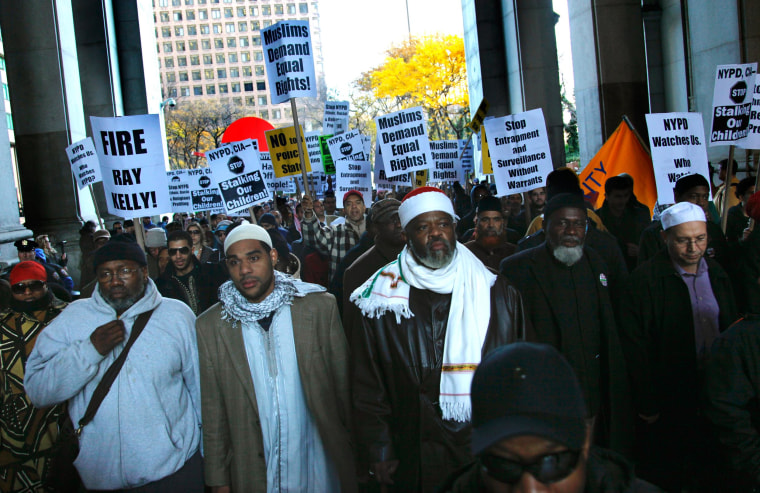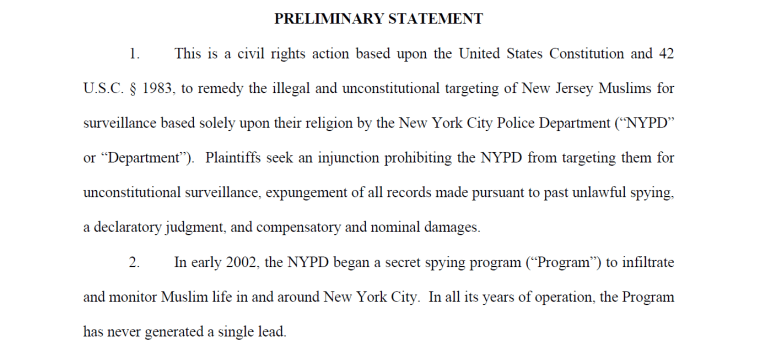One week after settling a pair of lawsuits over alleged police surveillance of Muslims, New York City said in a court filing last Friday that a federal judge should dismiss another lawsuit brought in 2012 that accuses the New York Police Department (NYPD) of using a secret program to spy on Muslims.
In the 10-page document filed in United States District Court in New Jersey, the city argued in part that the lawsuit, brought by lead plaintiff Farhaj Hassan, should be thrown out because of a Jan. 7 proposed settlement in Handschu v. Special Services Division, which accused the city of violating a long-standing consent decree in investigating Muslims.

The Handschu guidelines date back to 1985 when rules were established on how intelligence can be collected during activities, including political ones, protected by the First Amendment. Following the attacks on Sept. 11, 2001, the city applied to remove restrictions and oversight from the Handschu guidelines, a request that a judge granted. Updates will be made to reflect the terms of the Jan. 7 settlement, which still requires federal court approval.
In response to Hassan’s lawsuit, city Law Department spokesman Nick Paolucci told NBC News in a statement that “the city denies allegations that the police department investigates based on religion and has asked the court to dismiss the suit in its entirety.”
RELATED: New York City Settles Lawsuits Concerning Muslim Surveillance, Will Institute Reforms
Glenn Katon, legal director of Muslim Advocates, the civil rights organization representing Hassan and other plaintiffs in the lawsuit, called the city’s argument for dismissal “indefensible.”
“The revisions to the Handschu guidelines have yet to be approved by the court, and even if they take effect, they will not actually apply to any of the activities that we’re complaining about for our plaintiffs,” Katon told NBC News Wednesday.
The city’s filing last week was the latest move in a lawsuit begun in October 2012 that U.S. District Judge William J. Martini dismissed in February 2014 and that an appellate court sent back to Martini last October. In its ruling, the three-judge panel concluded that the allegations raised tell "a story in which there is standing to complain and which present constitutional concerns that must be addressed and, if true, redressed," according to court documents.
RELATED: Court Reopens Lawsuit Against NYPD for Post-9/11 Surveillance Program
The plaintiffs, which include a former grade-school principal for Muslim girls, argue that Muslim religious identity was being used as a "permissible proxy for criminality" in the NYPD's surveillance program, which began in 2002. According to court documents, the plaintiffs allege the NYPD monitored Muslims, their businesses and houses of worship, as well as schools and organizations in New York City and New Jersey.
The program's intent, the plaintiffs argue, was to "target Muslim entities and individuals in New Jersey for investigation solely because they are Muslim or believed to be Muslim," rather than because there was "evidence of wrongdoing," according to court documents.
The plaintiffs allege that the NYPD employed a number of spy tactics, including taking photos and video, gathering license plate numbers of mosque congregants, and installing video cameras on light poles aimed at mosques that authorities could control by computer, court documents said.
The city’s filing last week denied allegations made in Hassan’s lawsuit, which seeks to stop the NYPD from surveilling the plaintiffs because of religion and to order the department to expunge any records of the plaintiffs, such as notes and photographs, made because of alleged spying.

The Associated Press reported on the NYPD’s surveillance program in 2011, saying it was so secretive that then-Newark Mayor Cory Booker, who is now a U.S. senator from New Jersey, didn't even know about it.
In 2014, the NYPD disbanded the unit involved in the program, a decision that, at the time, drew praise from New York City Mayor Bill de Blasio.
For the proposed settlement reached two weeks ago, the NYPD will implement a number of reforms, including banning investigations in which "race, religion or ethnicity is a substantial or motivating factor" and prohibiting investigations that are open-ended.
Without admitting any wrongdoing, the NYPD agreed to limit its use of undercover officers and informants for instances when information sought in an investigation "could not reasonably be obtained in a timely and effective manner by less intrusive means," according to the agreement. The city will also appoint a civilian representative, an attorney who will hold the position for at least five years, to make certain that the safeguards detailed in the settlement are followed.
The changes, in some instances, will codify NYPD practices already in place.
In addition to the Handschu case, the settlement also applies to Raza v. City of New York, named after lead plaintiff Imam Hamid Hassan Raza. That lawsuit was brought in 2013 and accused the NYPD of violating the state and U.S. constitutions by "singling out and stigmatizing entire communities of New Yorkers based on their religion," according to the American Civil Liberties Union.
While Katon said the settlement was not a “panacea,” he added he was very excited about a number of the reforms included in it.
“[It’s] totally a step in the right direction,” he said.